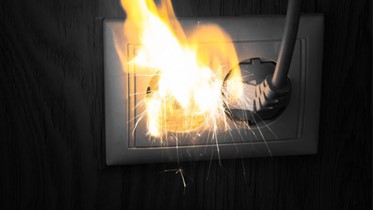
You’re enjoying a quiet evening at home when you suddenly smell something burning. You trace the scent to an outlet that’s been quietly overheating for weeks. This is a common scenario that many homeowners face, often without realizing it until it’s almost too late. That slight discoloration around the outlet or the faint sizzling sound might have seemed insignificant at first. However, with electrical safety, small issues can quickly escalate into major problems.
It’s easy to ignore minor electrical concerns, like a flickering light or a tripping breaker, especially when life gets busy. However, putting off addressing these signs can lead to dangerous situations. Let’s dive into some crucial tips and insights on how to safeguard your home from electrical hazards, ensuring a safe environment for you and your loved ones.
Electrical Safety Hazards You Need to Be Aware of
Electrical problems come in many forms, from the obvious to the more subtle. While some issues, like a constantly tripping circuit breaker, are apparent, others might not be so noticeable but still pose significant risks. Here are some critical hazards you should know about:
Faulty Wiring
Faulty wiring is one of the leading causes of electrical fires. Over time, wiring can degrade, creating shorts and sparks. Signs of faulty wiring include flickering lights, frequent power surges, and outlets that are warm to the touch. If you notice any of these issues, it’s time to get a professional assessment.
Overloaded Circuits
Overloaded circuits occur when too many devices draw power from a single electrical source. This can cause overheating and potentially start a fire. Common signs include frequently blown fuses or trips in the circuit breaker. It’s essential to distribute your electrical load properly to avoid these issues.
Electrical Fires
Electrical fires are particularly dangerous because they can start unnoticed and spread quickly. They often begin behind walls or at overloaded outlets. Look for signs such as burning smells, scorch marks on outlets, and buzzing sounds near your electrical fixtures.
Outdated Electrical Systems
Many older homes still rely on outdated electrical systems, which are not equipped to handle modern power demands. These systems can be prone to failures and inefficiencies, increasing the risk of electrical hazards. If your home hasn’t had an electrical update in over 20 years, it may be time for an upgrade.
Safely Using Electrical Outlets and Power Strips
Proper use of outlets and power strips is vital for home electrical safety. Avoid overloading outlets with multiple high-wattage devices. Use power strips with built-in surge protectors to safeguard your electronics against voltage spikes. Regularly inspect cords and plugs for damage; frayed wires or bent prongs can cause shorts and fires. Make sure to plug major appliances directly into wall outlets instead of using extension cords or power strips.
Make Sure You Childproof Electrical Outlets
If you have young children, childproofing your electrical outlets is a must. Curious little fingers can easily find their way into unprotected outlets, posing a severe risk of shock or burns. Use outlet covers or tamper-resistant receptacles to keep children safe. These devices block access to the contacts unless equal pressure is applied to both sides, thus preventing any accidental insertion of foreign objects.
Guidelines for Safe Usage of Home Appliances
Home appliances are integral to daily life, but improper usage can lead to electrical hazards. Always follow the manufacturer’s instructions for operating and maintaining your appliances. Unplug small appliances when not in use to reduce the risk of overheating and fires. Keep appliances away from water sources to avoid potential electrocution. Also, regularly inspect appliances for wear and tear and replace damaged cords or parts immediately. This proactive approach allows your appliances to operate safely, contributing to overall electrical safety at home.
Install Ground Fault Circuit Interrupters
Ground Fault Circuit Interrupters (GFCIs) are important for areas prone to moisture, such as kitchens, bathrooms, and outdoor locations. GFCIs detect ground faults and instantly cut off power to prevent shocks. Installing these devices can significantly reduce the risk of electrical injuries and fires. GFCIs are a crucial component and one of those electrical tips for homeowners that you don’t want to ignore. By providing an extra layer of protection where it’s needed most, you can keep your home secure, preventing shocks that can lead to disastrous outcomes.
Upgrade Electrical Panels
An outdated electrical panel can be a ticking time bomb. Modern appliances and electronics require more power, which old panels might not support. Upgrading outdated electrical equipment like your panels helps handle current electrical loads, reducing the risk of overloads and fires. A new panel also provides room for expansion, allowing you to add more circuits as needed. This upgrade is a smart investment in your home’s electrical safety, providing you with a reliable power supply and great protection against hazards.
Try Whole Home Surge Protectors
Lightning strikes and power surges can cause significant damage to your home’s electrical system and connected devices. Whole home surge protectors offer comprehensive protection by safeguarding your entire electrical system from voltage spikes. Installing these protectors helps prevent costly damage to appliances and electronics, making them a hugely important electrical safety tip for your home.
Don’t Ignore Electrical Problems. Call on SMART Electric, Heating and Air
Ignoring electrical problems can negate all your efforts to keep your home safe, increasing the risk of disastrous situations. At SMART Electric, Heating and Air, we’ve got your back. Our team is ready to help you address any electrical concerns, keeping your home safe and secure. Speak with us today the minute you notice electrical issues.